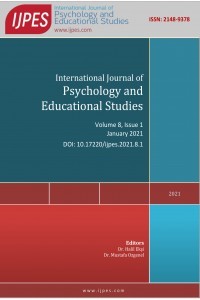Is Reward A Punishment? from Reward Addiction to Sensitivity to Punishment
This study introduces the topics of reward addiction and sensitivity to punishment in academic contexts to the literature. This study was designed firstly to develop reliable and valid measurement tools that can measure high school students' reward addiction and sensitivity to punishment in academic contexts, and secondly to test the structural equation model formed to identify the relationships between reward addiction and sensitivity to punishment. The participants of the study were a total of 506 high school students. Exploratory and confirmatory factor analyses showed that the developed measurement tools were valid and reliable. According to the structural equation model formed between the variables of reward addiction and sensitivity to punishment, the reward addiction variable significantly and positively affected sensitivity to punishment. The findings of this study inform both parents and educators with a new perspective about the possible negative results of using punishment and rewards in academic context
Keywords:
Reward Addiction, Punishment Sensitivity, Academic Context Student,
___
- Arbuckle, J. L. (1995–2008). Amos 17.0 user’s guide. Crawfordville, FL: Amos Development Corporation.
- Aypay, A. (2016). Akademik Bağlamda Ödül Bağımlılığının Ebeveynlik Tarzı ve Cinsiyet ile İlişkileri. VIII. International Congress of Educational Research. “Quality Assurance in Higher Education and Accreditation of Faculties of Education”. 5-8 May, Çanakkale Onsekiz Mart University, Çanakkale, Turkey.
- Aypay, A. (2015). Sensitivity to punishment in the academic context: it’s relationship with locus of control, gender and grade level. Egitimde Kuram ve Uygulama - Journal of Theory and Practice in Education, 11(4), 1475-1495.
- Bayram, N. (2010). Yapısal eşitlik modellemesine giriş: Amos uygulamaları. Bursa: Ezgi Kitabevi.
- Cavanagh, J. F., Frank, M. J., & Allen, J. J. B. (2011). Social stress reactivity alters reward and punishment learning. SCAN, 6, 311-320. doi: 10.1093/scan/nsq041
- Carver, C. S. (2004). Negative affects deriving from the behavioral approach system. Emotion, 41, 3–22. doi: 10.1037/1528-3542.4.1.3
- Corr, P. J. (2002). J.A. Gray’s reinforcement sensitivity theory and frustrative nonreward: A theoretical note on expectancies in reactions to rewarding stimuli. Personality and Individual Differences, 32, 1247–53. doi:10.1016/S0191-8869(01)00115-5
- Corr, P. J., Pickering, A. D., & Gray, J. A. (1997). Personality, punishment, and procedural learning: A test of J. A. Gray’s anxiety theory. Journal of Personality and Social Psychology, 73, 337-344.
- Deci, E. L., & Ryan, R. M. (1985). Intrinsic motivation and self-determination in human behavior. New York: Plenum Press.
- Delgado, M. R., Locke, H. M., Stenger, V. A., & Fiez, J. A. (2003). Dorsal striatum responses to reward and punishment: Effects of valence and magnitude manipulations. Cognitive, Afective, & Behavioral Neuroscience, 3(1), 27-38.
- Farmer, R. F. (2005). Temperament, reward and punishment sensitivity, and clinical disorders: Implications for behavioral case formulation and therapy. International Journal of Behavioral Consultation and Therapy, 1(1), 56-76.
- Gray, J. A. (1990). Brain systems that mediate both emotion and cognition. Cognition and Emotion, 4, 269–288.
- Gray, J. A. (1991). The neuropsychology of temperament. In J. Strelau & A. Angleitner (Eds.), Explorations in temperament: International perspectives on theory and measurement (pp. 105–128). New York, NY: Plenum Press.
- Gray, J. A., & McNaughton, N. (2000). The neuropsychology of anxiety (2nd ed.) London: Oxford University Press.
- Guimón, J., Las Hayas, C., Guillén, V., Boyra, A., & González-Pinto, A. (2007). Shame, sensitivity to punishment and psychiatric disorders. The European Journal of Psychiatry, 21 (2), 124-133.
- Harmon-Jones, E. (2003). Anger and the behavioral approach system. Personality and Individual Differences, 35, 995–1005. doi:10.1016/S0191-8869(02)00313-6
- Hundt, N. E., Brown, L. H., Kimbrel, N. A., Walsh, M. A., Nelson-Gray, R., & Kwapil, T. R. (2013). Reinforcement sensitivity theory predicts positive and negative affect in daily life. Personality and Individual Differences, 54, 350–354. doi:10.1016/j.paid.2012.09.021
- Kline, R. B. (2011). Principles and practice of structural equation modeling (Third Edition). New York/ London: The Guilford Press.
- Knutson, B., Adams, C. M., Fong, G. W., & Hommer, D. (2001). Anticipation of increasing monetary reward selectively recruits nucleus accumbens. Journal of Neuroscience, 21, RC159. [Available at: http://www- psych.stanford.edu/~span/Publications/bk01jn.pdf], Retrieved on January 1, 2015.
- Masitsa, G. (2008). Discipline and disciplinary measures in the Free State township schools: Unresolved problems. Acta Academica, 40(3), 234-270.
- Morgan, J. E., Bowen, K. L., Moore, S. C., & van Goozen, S. H. M. (2014). The relationship between reward and punishment sensitivity and antisocial behavior in male adolescents. Personality and Individual Differences, 63, 122–127. doi: 10.1016/j.paid.2014.01.054
- Muthén, L. K., & Muthén, B. O. (1998-2010). Mplus user’s guide (Sixth Edition). Los Angeles, CA: Muthén & Muthén.
- Patterson, C. H. (1973). Humanistic education. Englewood Cliffs, NJ: Prentice-Hall.
- Pink, D. H. (2009). Drive: The surprising truth about what motivates us. New York, NY: Riverhead Books.
- Shaikhnag, N., & Assan, T.E.B. (2014). The effects of abolishing corporal punishment on learner behaviour in South African high schools. Mediterranean Journal of Social Science, 5(7), 435-442. doi: 10.5901/mjss.2014.v5n7p435
- Segarra, P., Ross, S. R., Pastor, M. C., Montan˜e´s, S., Poy, R., & Molto´, J. (2007). MMPI-2 predictors of Gray’s two-factor reinforcement sensitivity theory. Personality and Individual Differences 43, 437–448. doi: 10.1016/j.paid.2006.12.013
- Van Der Linden, D., Beckers, D. G. J., & Taris, T. W. (2007). Reinforcement sensitivity theory at work: Punishment sensitivity as a dispositional source of job-related stress. European Journal of Personality, 21, 889–909. doi: 10.1002/per.660
- Van der Linden, D., Taris, T.W., Beckers, D.G.J., & Kindt, K.B. (2007). Reinforcement sensitivity theory and occupational health: BAS and BIS on the job. Personality and Individual Differences, 42, 1127–1138. doi: 10.1016/j.paid.2006.07.029
- ISSN: 2148-9378
- Başlangıç: 2014
- Yayıncı: Mustafa ÖZGENEL
